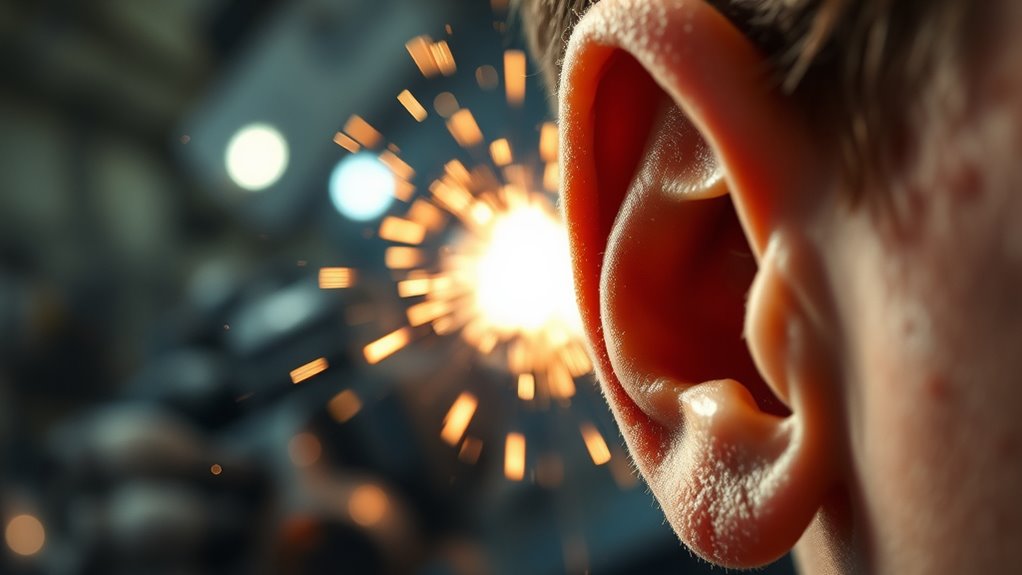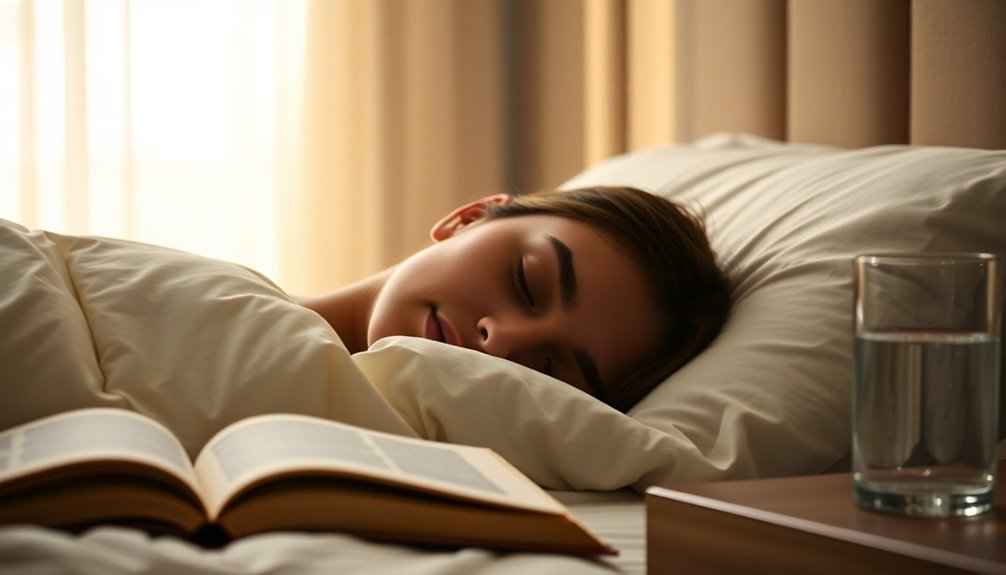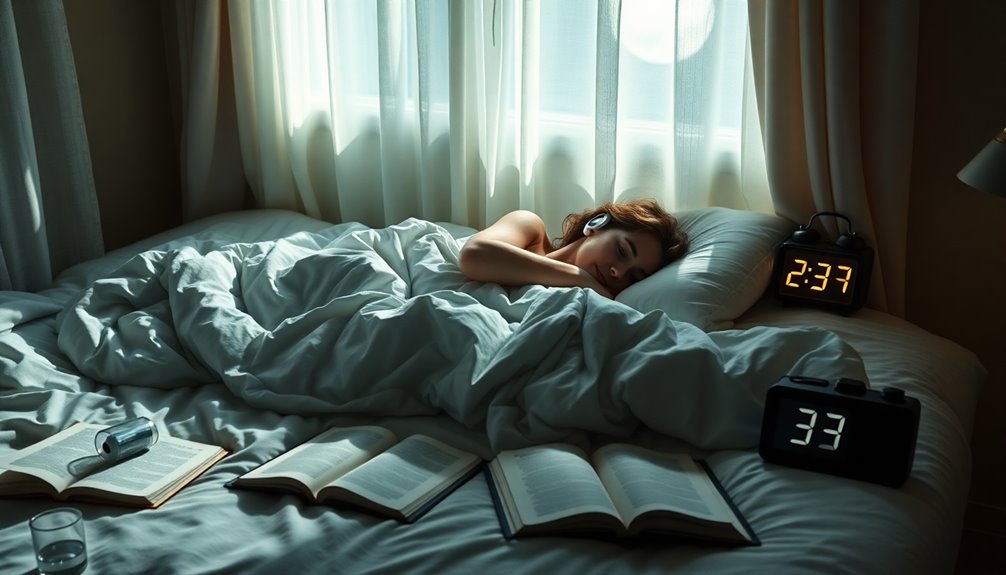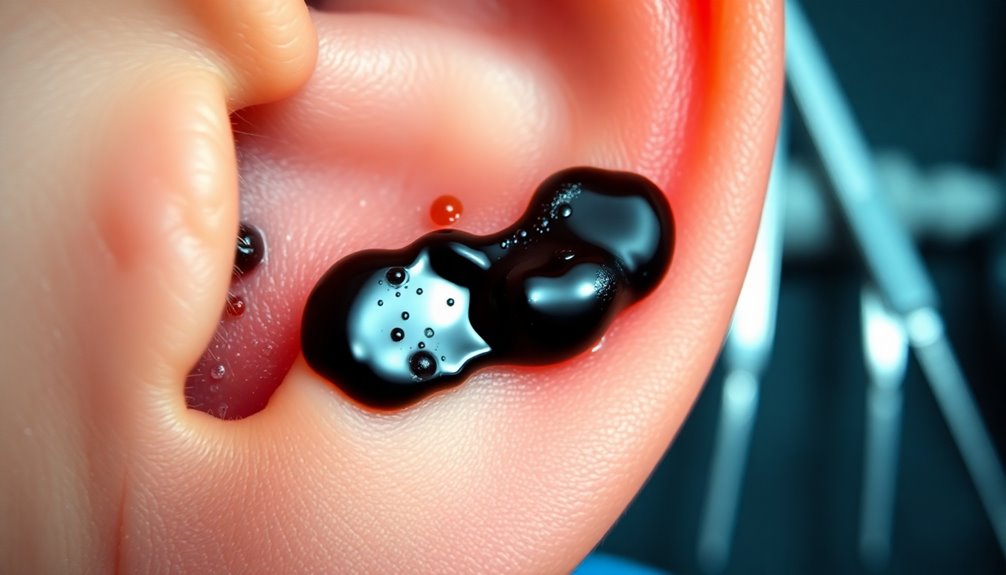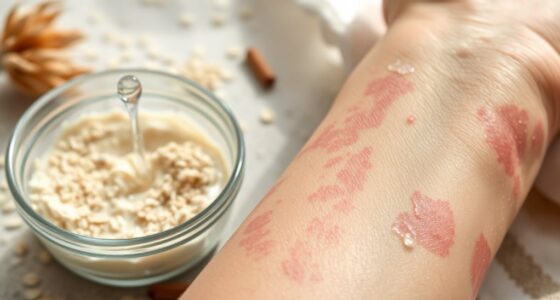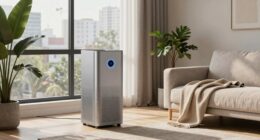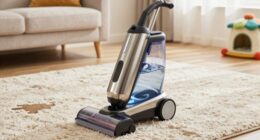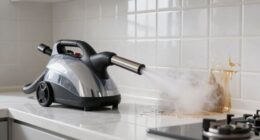Noise-induced hearing loss happens when loud sounds damage the tiny hair cells in your inner ear, which don’t heal once destroyed. Sounds above 85 decibels can cause harm, especially with prolonged exposure, or even immediately if they’re extremely loud. To prevent damage, limit your time near loud noises, wear ear protection, and take breaks. Staying aware of noise levels helps protect your hearing. If you want to discover more ways to keep hearing sharp, keep exploring.
Key Takeaways
- Loud sounds above 85 dB damage inner ear hair cells, leading to permanent hearing loss.
- Continuous exposure to high noise levels overloads the inner ear, causing cellular damage and nerve deterioration.
- Short-term loud noises can cause immediate impairment, while prolonged exposure worsens hearing over time.
- Using ear protection like earplugs or earmuffs reduces risk of damage from loud environments.
- Regular hearing assessments enable early detection and intervention to prevent further hearing deterioration.
Understanding the Basics of Hearing and Noise

Hearing is a intricate process that permits you to perceive sound waves and interpret them as meaningful information. When sound waves reach your ears, they vibrate your eardrum and tiny bones in your middle ear. These vibrations transfer to your cochlea in the inner ear, where tiny hair cells convert them into electrical signals. Your auditory nerve then sends these signals to your brain, which processes and gives them significance. Noise, in this context, refers to unwanted or damaging sounds that overwhelm your auditory system. Understanding how your hearing functions helps you recognize how exposure to loud sounds can damage these fragile structures. Protecting your ears begins with knowing how sound travels and influences your hearing health.
How Loud Sounds Damage the Inner Ear
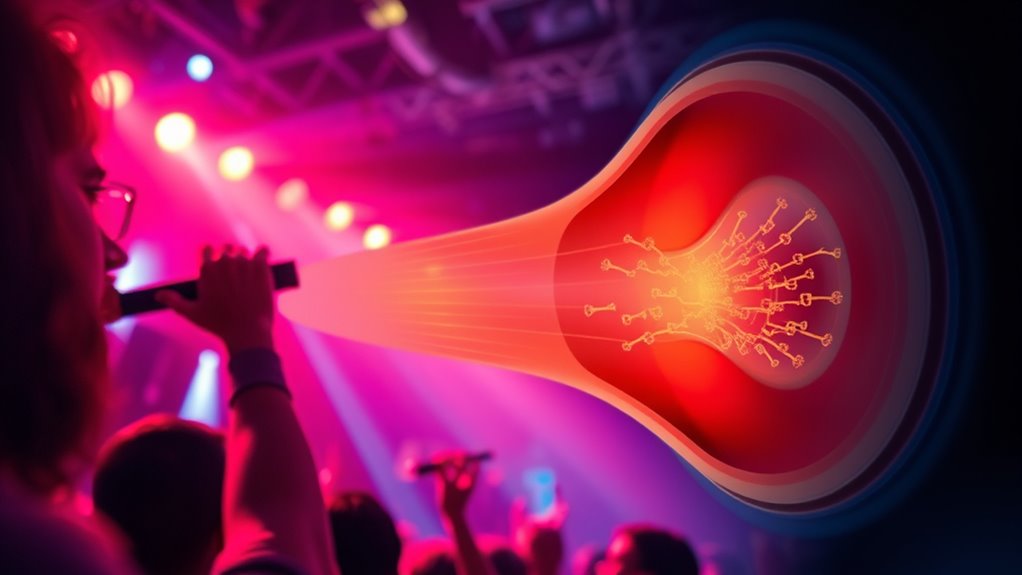
When sounds are too loud, they can damage the tiny hair cells in your inner ear that help you hear. This overload can cause these cells to break or die, leading to hearing loss. Understanding noise level thresholds helps you protect your ears from permanent damage. Using protective strategies, such as wearing earplugs, can help minimize exposure to harmful noise levels.
Hair Cell Damage
Loud sounds can cause irreversible damage to the delicate hair cells in your inner ear, which are essential for converting sound waves into electrical signals your brain interprets. When exposed to intense noise, these hair cells bend excessively or break, leading to permanent loss of hearing. The damage often occurs gradually but can happen suddenly with very loud sounds. To protect your hearing, keep these points in mind:
- Prolonged exposure to loud noise can weaken or destroy hair cells over time.
- Once damaged, hair cells do not regenerate, making the loss permanent.
- Using ear protection in noisy environments minimizes the risk of hair cell injury.
- AI-driven personalization in hearing protection devices can optimize noise-canceling settings based on your environment.
Understanding this damage underscores the importance of safeguarding your ears against loud sounds to prevent hearing loss.
Inner Ear Overload
Exposing your inner ear to excessively loud sounds overwhelms its delicate structures, causing damage beyond just the hair cells. When noise levels spike, the tiny hair cells in your cochlea work overtime to transmit sound signals. This intense activity generates harmful free radicals and increases metabolic stress, leading to cellular damage. Over time, this overload can impair the entire sensory system, disrupting how your brain interprets sounds. The inner ear’s intricate structures aren’t built to handle constant high noise levels, and repeated overloads cause irreversible harm. Your cochlear tissues can swell, blood flow may become compromised, and nerve fibers can deteriorate. Additionally, air quality can influence ear health by affecting inflammation and overall bodily resilience. Ultimately, this overload diminishes your hearing ability, making sounds muffled or distorted, and increases the risk of long-term hearing loss.
Noise Level Thresholds
Have you ever wondered how loud sounds can damage your hearing? Noise level thresholds determine when sound becomes harmful to your inner ear. Sounds above 85 decibels (dB) can start damaging your hair cells over time. When noise exceeds this level, your inner ear struggles to process sound properly. To protect your hearing:
- Keep exposure below 85 dB whenever possible.
- Limit time spent near loud noises.
- Wear hearing protection, like earplugs or earmuffs, in noisy environments.
- Being aware of sound intensity helps you manage your exposure effectively.
Understanding these thresholds helps you avoid inadvertent damage. Prolonged exposure to sounds over 85 dB considerably raises your risk of noise-induced hearing loss. Recognizing safe levels and taking precautions can preserve your hearing health for years to come.
The Role of Decibel Levels and Duration of Exposure
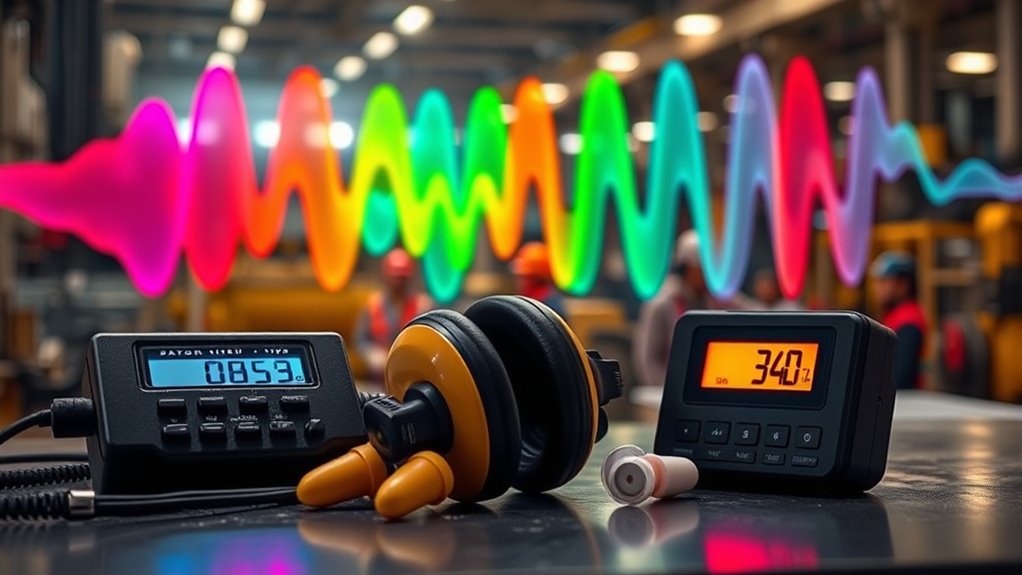
Decibel levels and the duration of exposure play a crucial role in determining the risk of noise-induced hearing loss. The louder the sound, the shorter the safe exposure time. For example, at 85 decibels, you can typically listen safely for up to eight hours. But if the volume increases to 100 decibels, your safe exposure drops to just 15 minutes. Prolonged exposure to high decibel levels causes tiny hair cells in your inner ear to become damaged or die, leading to permanent hearing loss. Even sounds at lower volumes can be harmful if you’re exposed for long periods. To protect your hearing, it’s essential to limit your exposure to loud noises and take breaks to give your ears time to recover. Regular exposure to loud sounds may also increase the risk of noise-induced hearing loss, emphasizing the importance of protective measures.
Early Signs and Symptoms of Hearing Damage

Early signs of hearing damage can be subtle but are important to recognize. You might notice the following:
Recognizing early signs of hearing damage is crucial for prevention and care.
- Difficulty hearing high-pitched sounds or soft speech, especially in noisy environments.
- The need to increase the volume on devices like TVs or headphones more than usual.
- Ringing or buzzing in your ears, known as tinnitus, that persists after exposure to loud noise.
- You may also experience hypersensitivity to certain sounds or discomfort when exposed to loud environments, which can be an early indicator of damage hearing sensitivity.
These symptoms may seem minor at first, but they are warning signs that your hearing may be deteriorating. Ignoring them can lead to more severe hearing loss over time. Pay attention to any changes in how you perceive sounds or if you experience discomfort after loud events. Early detection is key to preventing further damage.
Effective Strategies to Protect Your Hearing

Protecting your hearing starts with taking proactive steps to minimize exposure to loud noises. Wear ear protection like earplugs or earmuffs whenever you’re in noisy environments, such as concerts, construction sites, or using power tools. Keep the volume down when listening to music, videos, or using headphones—aim for no more than 60% of the maximum volume. Take breaks often; give your ears time to rest after loud activities. Avoid prolonged exposure to noise, especially at high decibel levels. If you work in a loud setting, follow safety guidelines and use hearing protection consistently. Staying aware of your environment and taking these small precautions can considerably reduce your risk of noise-induced hearing loss. Being informed about noise levels and their effects helps you better protect your hearing over time.
The Importance of Regular Hearing Checks
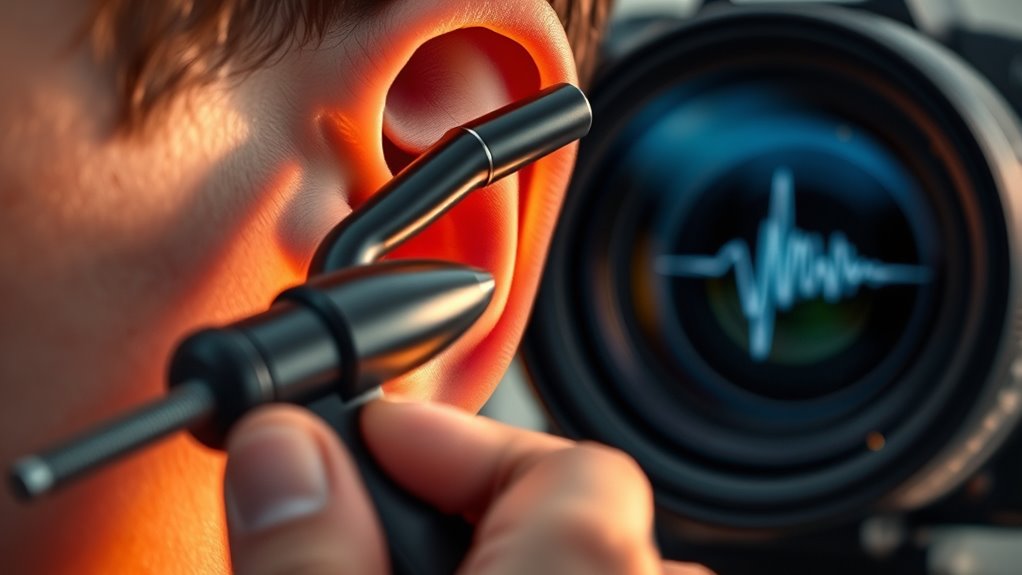
Taking proactive steps to safeguard your hearing is essential, but even with precautions, hearing health can change over time. Regular hearing checks help catch issues early before they worsen. They allow you to monitor your hearing ability and identify subtle changes that might go unnoticed. By scheduling routine tests, you can:
- Detect hearing loss early, increasing the chance for effective treatment.
- Adjust your hearing protection strategies based on new findings.
- Maintain overall hearing health and prevent further damage.
- Using the right ear protection can significantly reduce the risk of noise-induced hearing loss during exposure to loud environments.
These checkups are quick and non-invasive, providing valuable insights into your auditory well-being. Don’t wait for problems to become obvious—regular hearing assessments keep you informed and help you take timely action to preserve your hearing lifelong.
When to Seek Professional Help for Hearing Loss

Recognizing the signs of hearing loss is crucial to seeking help promptly. If you notice that conversations become difficult, you often ask people to repeat themselves, or you turn up the volume on devices, it’s time to consult a professional. Sudden hearing loss, ringing in your ears, or feeling like sounds are muffled also signal the need for immediate evaluation. Don’t ignore persistent or worsening symptoms, as early intervention can prevent further damage and improve your quality of life. If you experience any of these signs, schedule an appointment with an audiologist promptly. They can diagnose the issue, identify if noise exposure caused your hearing loss, and recommend appropriate treatments or hearing aids. Acting quickly ensures you get the help you need before the condition worsens. Monitoring and understanding the impact of noise-induced hearing loss can help you take preventive measures to protect your hearing health.
Frequently Asked Questions
Can Certain Medications Increase the Risk of Noise-Induced Hearing Loss?
Certain medications can increase your risk of noise-induced hearing loss. Drugs like aminoglycoside antibiotics, loop diuretics, and some chemotherapy agents can damage your inner ear cells, making you more vulnerable to loud noises. If you’re taking these medications, be extra cautious around loud environments, use hearing protection, and consult your doctor about potential risks. Taking these steps helps prevent further hearing damage while on these medications.
How Does Age Affect Susceptibility to Noise-Related Hearing Damage?
Think of your ears as a delicate amplifier that weakens over time, making you more vulnerable to noise damage. As you age, your cochlear hair cells become less resilient, similar to how a worn-out tire loses its grip. Studies show susceptibility increases after age 50. So, protect your hearing now; don’t wait until your ears are more prone to permanent damage, just like maintaining a vehicle prolongs its life.
Are There Genetic Factors That Influence Hearing Loss From Noise Exposure?
Genetic factors can influence how your ears respond to noise exposure. Some people have inherited genes that make their hearing more vulnerable or more resistant to damage. If you have a family history of hearing loss, you might be at higher risk. It’s important to protect your hearing, especially if you know you’re genetically predisposed. Regular checkups and avoiding loud noises can help preserve your hearing health.
What Are the Long-Term Health Effects of Untreated Noise-Induced Hearing Loss?
If you leave noise-induced hearing loss untreated, you may face long-term health effects like communication difficulties, social isolation, and emotional struggles. Over time, untreated hearing loss can increase your risk for mental health issues like depression and cognitive decline. It might also cause tinnitus, ringing in your ears, which can be persistent and bothersome. Protecting your hearing now helps prevent these serious, lasting health problems later on.
Can Lifestyle Choices Reduce the Risk of Developing Noise-Induced Hearing Loss?
You can lower your risk of noise-induced hearing loss by making smart lifestyle choices. Wear ear protection in loud environments, like concerts or construction sites, and keep volume levels moderate when using headphones. Regularly give your ears a break from loud sounds, and avoid prolonged exposure to noisy settings. Maintaining good overall health also supports ear health, helping you preserve hearing and prevent damage over time.
Conclusion
Protect your hearing by understanding how noise damages your ears, recognizing early signs, and taking proactive steps. Limit exposure to loud sounds, wear ear protection, and schedule regular hearing checks. Stay aware of decibel levels and listen to your body’s signals. Safeguard your hearing now, preserve your hearing later, and enjoy life’s sounds fully. Your ears are precious—care for them today to ensure they serve you well tomorrow.
